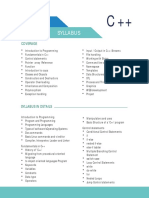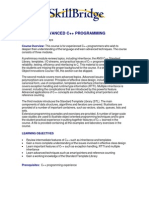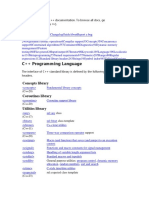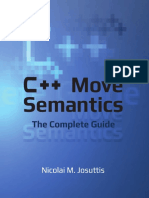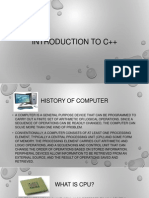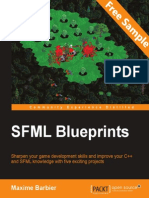Advanced C++ Programming Notes Outline
Page 1: Overview of C++ Programming
Introduction to C++
o History and evolution
o Key features and use cases
Basic syntax review
o Data types, variables, and operators
o Control structures (loops, if-else, switch)
o Functions and scope
Page 2: Object-Oriented Programming in C++
Classes and Objects
o Class definitions and member functions
o Constructors and destructors
Inheritance
o Single and multiple inheritance
o Virtual functions and polymorphism
o Abstract classes and interfaces
Page 3: Advanced Class Design
Operator Overloading
o Overloading arithmetic, relational, and assignment operators
o Stream operators overloading (e.g., << and >>)
Friend Functions and Classes
o Use cases and benefits
o Friend function implementation
Namespaces
o Creating and using custom namespaces
o std namespace and best practices
Page 4: Templates
Template Functions
o Generic programming with function templates
Template Classes
o Class templates for generic data structures (e.g., linked lists, stacks)
Template Specialization
o Full and partial specialization
Variadic Templates
o Use cases in template metaprogramming
o Implementing variadic template functions
Page 5: Exception Handling
Basic Syntax of Exception Handling
o try, catch, and throw keywords
Creating Custom Exceptions
o Defining and using custom exception classes
Exception Safety
o Resource Acquisition Is Initialization (RAII)
o Levels of exception safety (basic, strong, and no-throw guarantees)
Standard Exceptions
o Overview of standard C++ exception classes (std::exception, std::runtime_error, etc.)
Page 6: Standard Template Library (STL)
Overview of STL Components
o Containers, Iterators, Algorithms, and Functors
Containers in Depth
o Sequence containers (vector, deque, list)
o Associative containers (set, map, multiset, multimap)
o Container adapters (stack, queue, priority_queue)
Iterators
o Iterator types and categories
o Creating custom iterators
Page 7: Smart Pointers and Memory Management
Memory Management Techniques
o Dynamic memory allocation (new, delete)
o Avoiding memory leaks
Smart Pointers
o Types (std::unique_ptr, std::shared_ptr, std::weak_ptr)
o Best practices and use cases
Custom Memory Allocation
o Overloading new and delete operators
o Memory pools and custom allocators
Page 8: Multithreading and Concurrency
C++11 Thread Library
o Creating and managing threads
o Synchronization primitives (std::mutex, std::lock_guard, std::unique_lock)
Atomic Operations
o Using std::atomic for lock-free programming
Concurrency Patterns
o Producer-consumer, reader-writer, thread pools
Handling Race Conditions
o Deadlock detection and prevention strategies
Page 9: Advanced File I/O and Serialization
File Streams
o Reading and writing binary files
o Using fstream, ifstream, and ofstream
Serialization Techniques
o Saving and loading objects
o Boost Serialization library
Working with JSON and XML
o Third-party libraries like RapidJSON, TinyXML
o Using std::filesystem for file manipulation
Page 10: Modern C++ Features (C++11 and beyond)
Lambda Expressions
o Syntax and use cases
Range-Based For Loops
o Iterating over containers
Auto Keyword and Type Inference
o auto and decltype usage
Move Semantics and Rvalue References
o Move constructors and move assignment operators
Structured Bindings and std::optional
o Making code more expressive and handling optional values
























